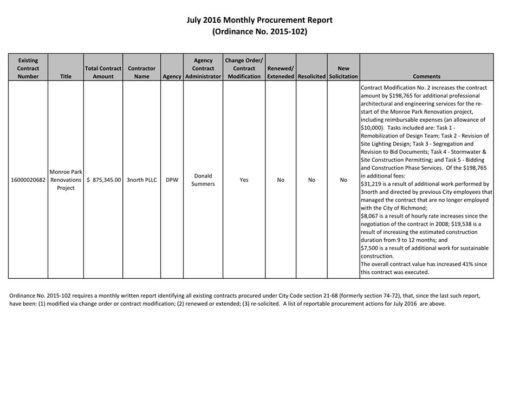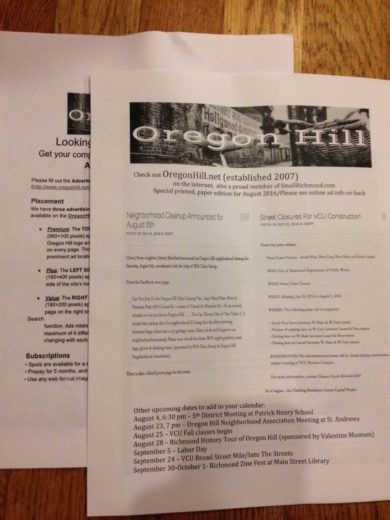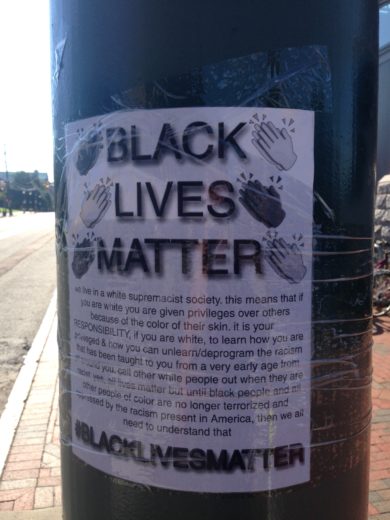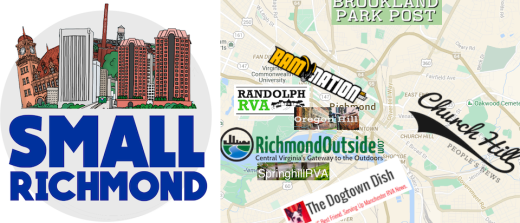Nothing better than a good history rumble, and RVAHub.com may have started one with a post on the history of Harvie’s Pond that tries to reintroduce some troubling assertions about the history of the James River and Kanawha Canal.
What’s particularly worrisome is how RVAHub.com is glossing over the earlier debate itself.
From a 2013 post on this site, entitled “Dueling Maps of the Towpath”:
Venture Richmond Director Jack Berry gave a presentation on the proposed amphitheater at the July meeting of the Oregon Hill Neighborhood Association. One the main assertions Berry made was that the tow path on the south bank of the canal was only 12 feet wide until it was enlarged in the 1880s to make way for the railroad. He wants to remove over half of the tow path on the south bank of the canal, from 25 to 12 feet to improve the sight lines of the the proposed amphitheater.
Disproving Berry’s assertion is the 1848 plat of Lewis Harvie’s property on file at the Henrico Courthouse (Plat 3-417), which is far more detailed than the Morgan map cited by Berry. This plat is of such detail that it actually gives the dimension of the tow path as being 30 ft. wide at the location of what is now Venture Richmond’s proposed amphitheater. (See measurement on the attached Henrico Plat below the word “Path” to the left of the “House.”) The east-west street above the canal is the same width as the tow path and is also labeled “30 feet wide.”
This 1848 Henrico plat establishes that the towpath was at least as wide as it is today during the canal’s primary period of significance, and long before the railroad purchased the right-of-way on the canal bank. This canal was carefully engineered with an impermeable “puddled” clay layer that would be irreparably damaged if half of the south canal bank is removed.
Sadly, this has happened. In late June, early July of 2014, Venture Richmond ignored citizen concerns and compromised the integrity of the historic canal.
In doing so, Venture Richmond and City government ignored the findings of a large report on this historic area that was completed earlier that year. That report concluded with this paragraph:
In 1989 a joint Virginia House and Senate resolution honored the bicentennial anniversary of the opening of the James River Canal, recognizing that the “James River Canal, around the falls of the James River in Richmond, Virginia was the first operating canal system with locks in the United States,” and recognizing the canal, “… as a valuable, scenic, historic and economic resource to the Commonwealth and its capital city.” The James River and Kanawha Canal has survived and been treasured as a remarkable feature for a dozen generations. Will we be the generation that jeopardizes the canal, allowing the tow path embankment of this rare, historic structure to be cut because it blocks the view of a rock band?
It’s definitely worth noting that Jack Berry, as the Executive Director of Venture Richmond, dishonorably broke a repeated public promise to this community and government. From neighbor Todd Woodson:
“It is outrageous that Venture Richmond is breaking its repeated promises to submit the amphitheater plan to an impartial state and federal review through the Section 106 process. We have spent a year researching the canal, and we have documentation that the current tow path and and embankment are authentic and will be greatly damaged by the amphitheater plan.”
Flash forward to 2016 and the same Jack Berry is now running for Mayor, complete with a slick video and lots of support from the Ukrops and other members of the local corporate oligarchy. Does anyone doubt that Berry, if elected Mayor, will put his backers’ corporate interests over the concerns of citizens and neighbors? As the election draws nearer, there are other important points to consider and I will try to get to them, but this “history debate” says a lot about the character of Berry. Also, is Venture Richmond is disingenuously delaying its interactions as they wait to see if Berry is elected or not?
Sure, a lot of people may not care that much about a nerdy debate over old maps, water levels, and historic preservation (though it should be held in higher regard based on future planning, and more!), but the bigger picture is who owns the history as we get ready to elect our new leaders. Sadly, I cannot help but compare this RVAHub.com post, which puts forward Venture Richmond’s version, with previous attempts to push Venture Richmond’s propaganda (to the point of dishonestly suggesting that this neighborhood is against the Folk Festival). The stance of this community news site is that the history belongs to all of us, and while different interpretations are certainly welcome, they should not be used as tools of corporate hegemony to the detriment of the community and the truth.




